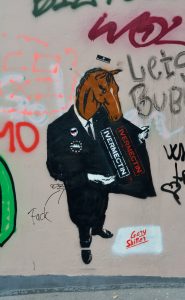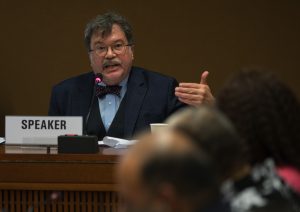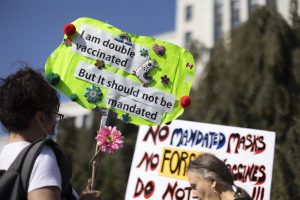
As someone who grew up chronically online, I never would have guessed that dance videos and SpongeBob memes could be used as tools for teaching science. Yet here we are. Scientists and medical professionals are breaking down complex concepts through TikToks, tweets, and podcasts. Social media has made science approachable and accessible to individuals far outside the ivory tower. Scientists, both young and old, have carved out their niche across the many platforms available today by adding science twists to viral trends, opening up about challenges they have faced while doing research, and communicating their findings in an easily digestible manner.
However, these same platforms utilize algorithms that prioritize emotionally charged content and reinforce one’s existing beliefs. All-or-nothing statistics, half-truths, and intense personal testimonies often blur the line between fact and fiction. Misinformation can spread quickly and have serious real-world consequences.
COVID Misinformation Fueled by Politics and Algorithms
The COVID-19 pandemic brought the science community into the spotlight as people searched for information about the virus. Many scientists and public health experts appeared on popular podcasts, or started their own, to provide some clarity amid the chaos. In the U.S. alone, the number of podcast listeners grew as much as 40% from 2019 to 2022. The accessibility of podcasts made them a major source of entertainment and information. As science communicators reached new audiences, so, too, did those promoting doubt in vaccines, public health agencies, and science itself. The health freedom movement—which argued that mask mandates, required vaccinations, and lockdowns were government overreach—gained traction across conservative podcasts and social media, turning some platforms into breeding grounds for misinformation.
The Joe Rogan Experience, which has topped the podcast charts for years, quickly turned into a platform for anti-vaccine sentiments and misinformation. Early in the pandemic (April 2020), Rogan hosted Dr. Peter J. Hotez, an alumnus of the Tri-I M.D.-Ph.D. program who has experience in vaccine development and public health, to discuss the potential progression of the coronavirus pandemic. At the time, Rogan emphasized the importance of scientific research and pandemic prevention—a striking contrast to the anti-vaccine rhetoric that would emerge in later episodes, apparently in response to government vaccination mandates.
Rogan claimed that he wasn’t an anti-vaxx person and said that listeners shouldn’t take his medical advice, but he also defended hosting individuals, including medical professionals and scientists, who were known for spreading misinformation. In September 2021, Rogan announced that he had contracted COVID and was being treated with ivermectin, an anti-parasitic drug. Ivermectin surged in popularity afterward, arguably due to Rogan’s consistent promotion of the drug.
In addition to Rogan’s personal testimony, The Joe Rogan Experience featured medical professionals and scientists, including Dr. Bret Weinstein and Dr. Pierre Kory, who were staunch supporters of ivermectin. Dr. Kory, a practicing physician, prescribed ivermectin to patients despite a lack of guidance from the Centers for Disease Control and Prevention or medical boards. While on the podcast, Weinstein and Kory claimed that the government, mainstream science, and pharmaceutical companies were censoring them, arguing that ivermectin was not approved by mainstream science because there was “no money to be made off of it.” Kory backed up his support for ivermectin by citing published trials and articles that discussed ivermectin’s efficacy in infected patients.
Many of these articles, however, were later found to be flawed or misleading, and some were outright retracted. On the podcast Science Vs, Kory was confronted with this evidence, but he continued to stand by his position. Kory’s refusal to acknowledge changing or discredited data highlights a larger issue: the selective use of scientific studies by scientists and medical professionals can mislead the public and catalyze further distrust, even if this was not the original intention.

This kind of misrepresentation of data can be life threatening, which unfortunately became apparent during the later stages of the pandemic. As ivermectin was touted as an alternative to vaccination, the health freedom movement was taking full form in more conservative communities, often fueled by right-leaning politicians and social media influencers. An October 2021 poll conducted by the Kaiser Family Foundation indicated that out of the 27% of respondents who were not vaccinated against COVID-19, 60% identified as Republican or Republican-leaning. Other reports later identified that counties with more conservative views had higher reported COVID-19 deaths than Biden-leaning counties, which might have been prevented through vaccination.
Tactics Used to Spread Misinformation
We are now five years away from the start of the COVID-19 pandemic, but distrust in science has remained at an all-time high. The health freedom movement is still alive and well on various social media platforms and even among high-level political appointees (I’m looking at you, RFK Jr.). We are witnessing public health crises arising from anti-vaccination movements: measles, thought to be eradicated in the U.S. in the early 2000s, has seen a resurgence, with over one thousand cases this year alone.
So how did we get here? To start, we must acknowledge that scientific and medical communities had an indirect role in paving the road for health freedom movements. Unethical experimentation, such as the Tuskegee trials, has resulted in lasting distrust in vaccinations, medical research, and public health initiatives. Additionally, researchers have not been incentivized to communicate their research to individuals outside of academic circles. Conferences and meetings typically require membership in hosting organizations, which might not be attainable for non-scientists. Some journals operate through paywalls, and even if an individual can access the articles, they are often complex and riddled with jargon. Moreover, the prestige of holding a scientific or medical title can be deployed as proof that what someone is saying is true without explanation, alienating those who might have doubts. The health freedom movement has positioned itself as a truth-seeking alternative in response to the exclusivity of the scientific community.
As I engaged with health freedom content to get a better understanding of the framing used to discredit medical interventions and the science community, I took note of recurring tactics used across the movement. These included an emphasis on personal accounts of adverse side effects, the promotion of supplements or holistic care that lacked rigorous scientific testing, and, to my surprise, the strategic inclusion of scientists and medical professionals from reputable institutions. This last tactic lends credibility to the movement, reframing it as an alternative “citizen science” that challenges “mainstream science.”
The Conversations on Health Freedom podcast is hosted by Leslie Manookian, founder of the Health Freedom Defense Fund (a prominent legal challenger of federal COVID-era mandates), and promotes alternative perspectives on medicine and public health. Launched in 2022, the podcast hosts conversations with guests ranging from Manookian’s personal connections to medical professionals and scientists. Discussions center on themes of bodily autonomy and freedom in medical settings.
Earlier this year, Manookian hosted Drs. Amy Shyer and Alan Rodrigues, who co-lead the Laboratory of Morphogenesis at Rockefeller University. They were introduced as pioneers in holistic science, described as “really trying to understand rather than just accepting what they were taught.” Although Leslie did not mention Rockefeller University by name, she included links to the lab’s website in the podcast description and highlighted Shyer and Rodrigues’s training at prestigious institutions, including Harvard and Cambridge.
The selective presentation of Shyer and Rodrigues’s credentials is interesting because it exemplifies the strategy of leveraging scientific titles for credibility, even as Manookian consistently discredits traditional academia. Throughout the episode, both scientists agreed with Manookian’s critiques of modern medicine and scientific research. Rodrigues said that as society becomes more knowledgeable, we must question the “so-called” experts, which echoes common health freedom rhetoric. When contacted for comment, Rodrigues recommended this article for additional context on his and Shyer’s views.
While I agree that we as scientists should hold each other accountable and critically engage with each other’s data, I worry that these conversations support broader mistrust in academic research.
Combating Science Distrust Through Social Media
As social media continues to evolve, it is important that the scientific and medical communities evolve as well. Increased public engagement with research and health-related content makes it especially crucial that we be transparent about our data and intentional about whom we interact with. Scientists must be aware that our profession in itself is sometimes considered to be proof that what we are saying is true, even if listeners of podcasts like The Joe Rogan Experience and Conversations on Health Freedom are encouraged to make their own decisions.
As scientists, we can no longer afford to stay silent. Staying in our ivory towers and ignoring the spread of misinformation and distrust on social media allows false information to fill the void. We must actively and intentionally participate in the conversation, not solely to combat misinformation but also to make science more transparent, reliable, and (most importantly, in my opinion) relatable.
Figures like Dr. Mike and Dr. Noc, who use their platforms to address viral health content with clarity and empathy, show how professionals can gain large, engaged audiences on social media without sacrificing scientific rigor. On a more local note, podcasts like CancerCast from Weill Cornell and outreach hubs like RockEDU are working to share discoveries made in our community with a broader online audience. (Three RockEDU students recently launched a podcast of their own, Beyond the Lab.) By meeting individuals where they are, whether it be on social media, through a podcast, or even over drinks at a local pub, we have the opportunity to bridge gaps in their understanding before they are hardened to scientific distrust.
The future of science communication is moving away from dense, jargon-filled journals and towards meaningful conversations with people outside of the traditional academic bubble. If we want to make a difference, we must choose to show up. We must communicate in a digestible (not condescending) fashion, own up to our mistakes, be transparent and not selective with information, and try to earn back public trust without undermining the existing science community—one post at a time.

How to Spot Misinformation on Social Media
- Big claims (all or nothing)
- 100% of patients who took __ saw improvement!
- Emphasis on individual cases, especially those that trigger an emotional reaction
- My uncle had stomach issues and nothing helped. When he started taking __, he felt so much better. Everyone should try __ and see if it helps.
- “Link in bio” for product
- Overreliance on credentials as proof that claims are true
- Trust me, I’m a scientist at __.
- Evidence of claims is not linked
- Linked articles are not from a peer-reviewed journal or do not support the claims
